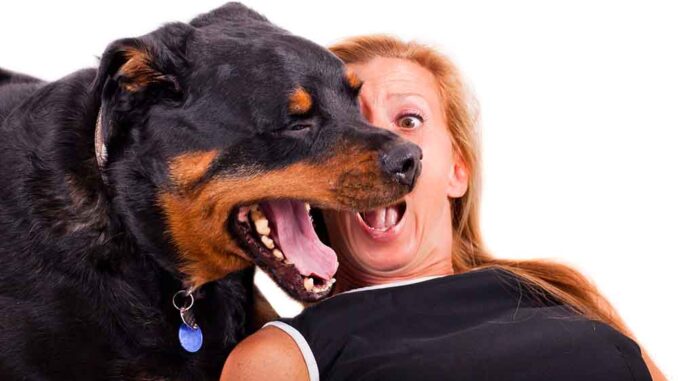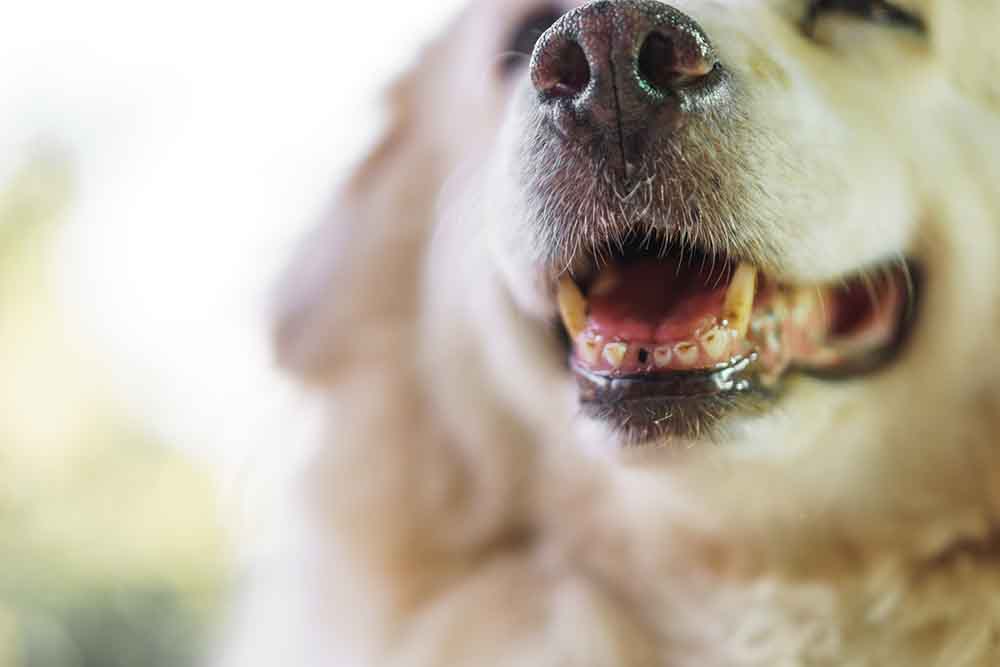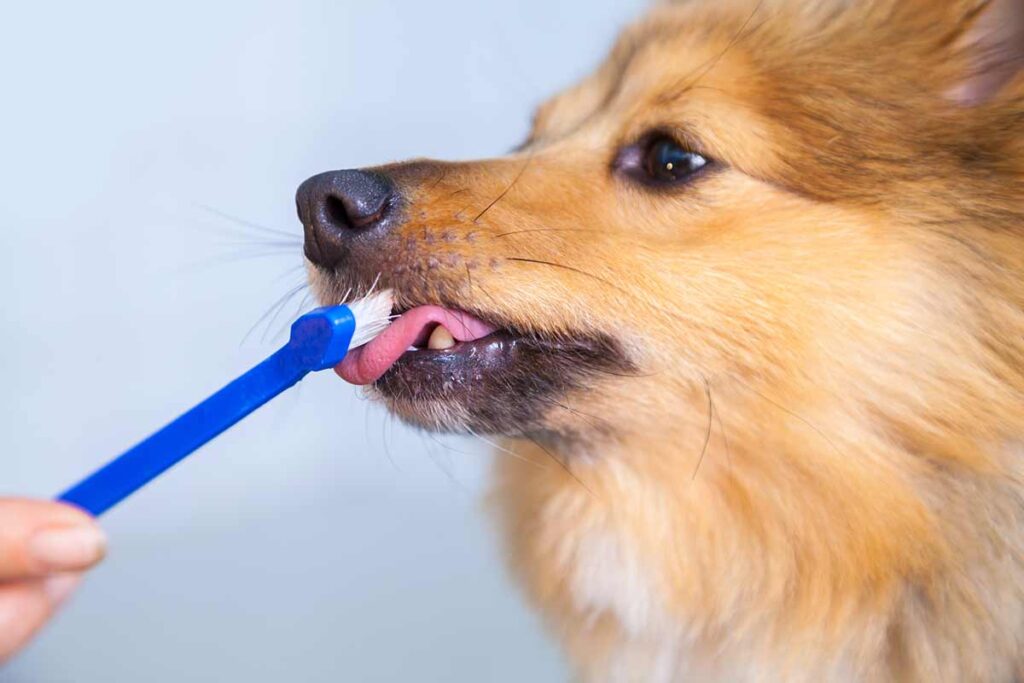
This article was updated on August 31st, 2023
Dog parents are no stranger to a little morning breath from their senior pups from time to time, but when bad breath comes on suddenly and sticks around, it’s time to be more concerned. Let’s find out why your senior canine companion may be experiencing bad breath and what you can do about it.
Top Causes of Bad Breath in Senior Dogs

Bad breath can come from the mouth and other areas of your older dog’s body. It can be an indicator that something is very wrong, so it’s important to find out what’s behind your dog’s bad breath.
1. Dental disease
A dirty mouth almost always leads to bad breath. Plaque and tartar accumulate on teeth, harboring bacteria and contributing to tooth decay. You may also notice bleeding from your dog’s mouth, not wanting to eat hard food and red, swollen gums.
At-home brushing with a dog-specific toothbrush and toothpaste can help to remove and prevent plaque and tartar buildup and relieve some mouth discomfort and bad breath.

However, dental disease usually requires a professional cleaning with antibiotics followed by preventive care. Dogs will need to be anesthetized for a professional cleaning. Medications, dental x-rays, and extractions may end up costing you $300-$800. Most senior pups respond well to a dental cleaning even with extractions.
2. Indiscriminate eating:
Some older canines develop some peculiar eating habits, ingesting poop and other unedible things. It may be due to a dietary deficiency, boredom or a little senility, either way, bad breath can ensue.
Make sure your dog is eating a good quality diet and doesn’t have any other underlying health issues, then look to his environment. Be sure to keep his area clean of feces and other things he may put in his mouth. You may also start him on some probiotics to boost his microbiome.
Products like For-Bid, or other coprophagia deterrents may help as well. Finally, give them some exercise and mental stimulation in the form of toys or playtime.
3. Kidney disease, liver disease, or diabetes
While these disease processes are completely different they can all share the same sign-bad breath. Anytime an organ isn’t functioning the way it’s supposed to it can cause changes in other areas of the body. The bad breath caused by these diseases may simply be foul, smell like acetone, or even smell like urine.
Dogs may also not be eating, have vomiting and nausea, weight loss, yellow skin, and increased drinking and peeing.
All of these diseases need to be diagnosed and treated by a veterinarian. Depending on the severity, supportive treatment of fluids and anti-vomiting medications may be given. Dietary changes may also help, and diabetes may respond to insulin treatment.
Look to spend at least $200 in the diagnosis. Where it goes from there will determine the rest of the cost with minor issues coming in around $200-$500 and life-long treatments costing $50-$100 or more a month.
4. Digestive issues
Besides eating things that they shouldn’t, having something off in their digestion may be the cause of your senior dog’s bad breath. Anything that upsets the stomach, causes vomiting, gas, or diarrhea can also cause bad breath. Viral or bacterial infections, megaesophagus, or a foreign object may all be behind it.
Look for vomiting, diarrhea, weight loss, abdominal pain, or not eating to be a part of it. Some minor upsets may respond to withholding food for 24 hours and offering small amounts of water. Other issues are going to need veterinary treatment and may cost $200-$1,000 or more if x-rays, ultrasound, or surgery is needed to fix it.
5. Cancer
Tumors anywhere in the mouth, throat, sinuses, or upper digestive system can lead to bad breath. You may also notice bleeding, difficulty swallowing, eating, or breathing. Some cancers can be treated with removal and chemotherapy, others may need raditation. The cost to treat these types of cancer is going to vary depending on what it is, where, and how far along it is.
How to Help Your Senior Dog’s Bad Breath at Home
If your older dog’s breath suddenly takes a turn for the worse, it’s time to do a little digging. Bad breath in senior dogs typically takes veterinary care, but there are a few at-home treatments to try first.
- Check your dog out. Try to pin point the cause of his bad breath by looking your dog over. Check his teeth, gums, tongue and oral cavity for any sign of reddness, swelling, tumors, or infection. You may also feel along your dog’s throat for any lumps or bumps. Take note of his appetite, urination and defecation habits, and whether he’s eating anything out of the ordinary.
- Check your dog’s diet. Run this by your veterinarian. Make sure you are feeding a diet formulated for senior dogs and the breed that you have. Some dogs may need supplements or dietary changes due to health conditions, so make sure all nutritional bases are covered.
- Start a dental cleaning regiment. Start doing the day-to-day stuff at home. Brush your dog’s teeth at least a couple times a week, feed dental treats like Greenies, and get them on a regular professional cleaning schedule for a fresher smelling mouth.
- See your veterinarian. Depending on any other signs that your older dog may be exhibiting, seeing your vet may come after trying a few things at home or it should come immediately.
When Should I See a Vet if My Senior Dog Has Bad Breath?
Only the most minor causes of bad breath in senior dogs can be treated at home. All other sudden down falls to your dog breath should be looked into by a veterinarian. If you notice any dental issues besides mild tartar buildup, professional cleaning is in order. Red, swollen gums, painful eating, or blood in the mouth will need antibiotics and deep cleaning.
If your pup has any changes to their appetite, increases in urination or water consumption, are vomiting or have diarrhea, weight loss, or lethargy, they should see a veterinarian. Have any lumps or bumps inspected professionally as well.
If you’re at all worried or surprised by your dog’s bad breath, don’t hesitate to get it checked out.
What Will The Vet Do and How Much Will it Cost?
When presented with a senior dog with bad breath, your vet will start with a thorough exam and history. They will check the mouth, nose, throat and feel the stomach. They may run blood work to check liver, kidney, and pancreatic function. They may so do x-rays or ultrasounds to get a look at the digestive system.
After a diagnosis for your dog’s bad breath is made, treatment can begin. Treatment of dental issues may require a professional cleaning with or without tooth extractions. Kidney and liver disease and diabetes may require fluids and supportive care along with medications and dietary changes to get your dog feeling better. Diabetes may require life-long treatment with insulin.
Cancer may need surgical removal, depending on where it is, radiation and chemotherapy. Some cancers may only respond to palliative care to keep your dog feeling as well as possible.
With this many variations in causes of bad breath in senior dogs, you will also expect a lot of variation in costs. Diagnostics may cost $100-$300, while treatments can be up to $1,000 or more with diabetes treatment costing $50-$150 per month for your dog’s lifetime. Generally speaking, the quicker you catch a bad breath issue, the less damage and expense it will cause.
Related post: dog has bad breath & licks a lot
Disclaimer: This website's content is not a substitute for veterinary care. Always consult with your veterinarian for healthcare decisions. Read More.


Help please
Hi Kandess and thank you for your message. We cannot provide any urgent help here, but do you have a question I can try to address? Dr. Linda